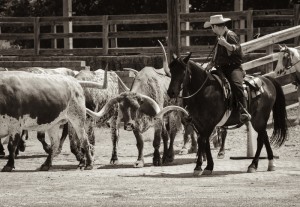via: USA TODAY
Longhorn cattle still roam the streets of this historic cow town.
Twice a day, grizzled men wearing authentic-looking hats, scarves and gloves climb atop of horses and slowly walk a herd of about 20 cattle – horns long enough to lance a human heart from 4 feet away – three blocks from the animals’ night pens to the day pens, then back again.
It’s a touristy spectacle in the city’s historic stockyards sponsored by the visitor’s bureau and aimed at the busloads of out-of-towners and gaggles of gawking grade-school students on field trips. But it’s also a nod to the city’s 19-century importance as a major cattle depot, from where thousands of head of cattle each year would slog north to Kansas City through the Chisholm Trail and onto plates in restaurants in Chicago, Boston and Washington.
Cowboys wrangled the cattle from remote corners of Texas and moved them through Indian Territory in Oklahoma on a journey that often took several months. Fort Worth was the last civilized stop before their long haul. The collection of saloons, brothels and bathhouses that sprouted around the stockyards led to such a degree of drunkenness, knife fights and general debauchery that it became known throughout the West as “Hell’s Half Acre.”
The Fort Worth Stockyards still echo that dusty history, with western-style saloons and steakhouses. But everywhere else the city is rapidly evolving beyond its cowboy past. Like other large Texas cities, Fort Worth, long associated with its larger sister city 30 miles to its east, Dallas, is drawing thousands of new residents, revitalizing its downtown and reinventing itself.
Fort Worth today is Texas’s fifth largest city and the 17th biggest in the country. Its population has grown from 741,000 in 2010 to more than 790,000 last year. Its economy is no longer reliant on cattle and processed meat and draws a growing number of dot.com entrepreneurs.
Most recently, the city made national headlines as the hometown of Wendy Davis, the Texas Democratic Senator whose 11-hour filibuster against anti-abortion legislation last summer shot her into political super-stardom and paved the wave for her current gubernatorial run. Around Fort Worth, Davis is known less for her political theatrics and more for helping to usher in downtown’s revival.
More than 1,400 downtown businesses generate $2.7 billion a year in private payroll receipts, while 2,642 downtown hotel rooms raise $15 million a year in taxes, , according to Downtown Fort Worth, Inc., an advocacy group and information clearinghouse.
Once-sleepy stretches such as the West Seventh Street Corridor, Sundance Square and Southside are morphing into hipster enclaves, replete with craft beer bars, coffeehouses and the Movie Tavern, where patrons could watch the latest X-Men flick while munching on a plate of edamame and sipping chardonnay.
If any place most neatly defines Fort Worth’s evolution, it’s the Spiral Diner and Bakery, a popular organic vegan eatery on West Magnolia Avenue in the city’s Southside. Diners munch on hummus wraps, vegan cupcakes and burgers made with soy protein patties – less than a 15 minute drive from where 10 million heads of cattle once trotted north up the Chisholm Trail.
The diner’s doing great, owner Lindsey Akey says. “It’s surprising but it’s been so good for us for so long that it just feels natural,” she says.
The restaurant opened a decade ago but the neighborhood really started ramping up around five years ago. “Some things start happening in the area and everyone starts moving in,” Akey says.
Zack Moutaouakil took over the Mercury Chop House in nearby Sundance Square in 2009. Things went so well that, three years later, he opened Cowtown Diner, an upscale diner serving bacon-wrapped deviled eggs and chicken and waffles. One major change he’s witnessed: more and more people moving into the city center.
“I remember when there wasn’t much going on downtown,” says Moutaouakil , a native of Morocco. “Now you have more people wanting to live closer to downtown. It’s changing every day. There’s more of a vibe.”
People in Fort Worth still comfortably wear cowboy hats. They still eat steak. But they’re also occasionally dabbling in vegan burgers and soy lattes. The vibe continues to evolve.
